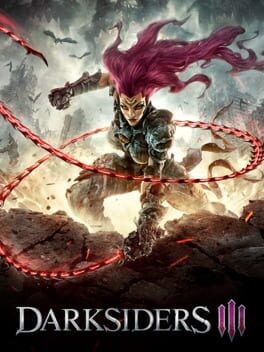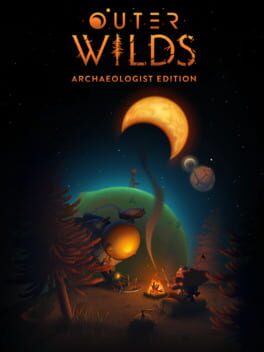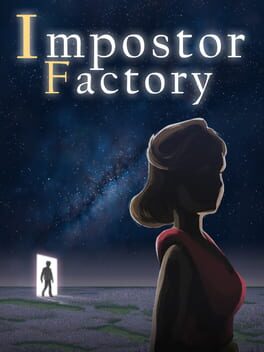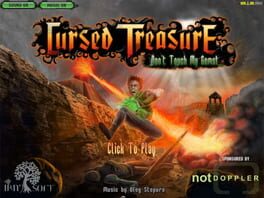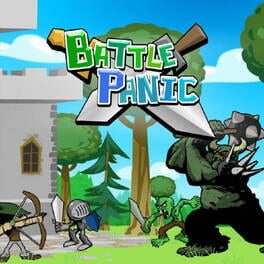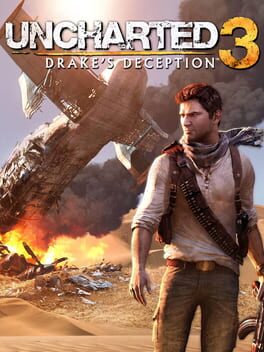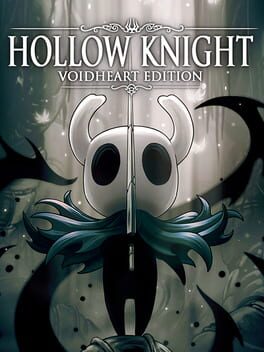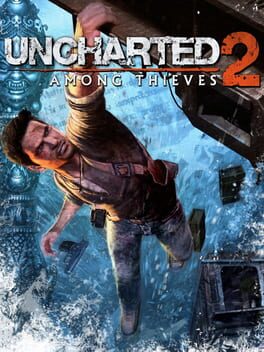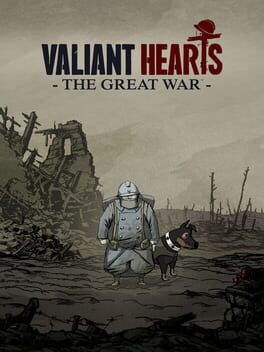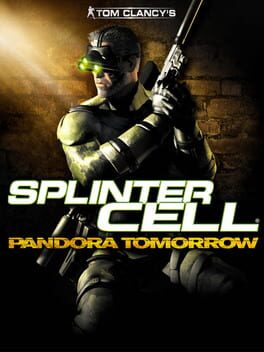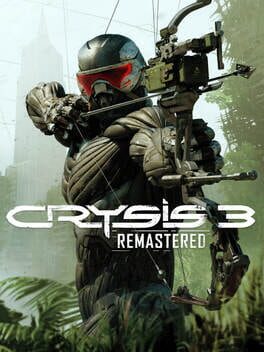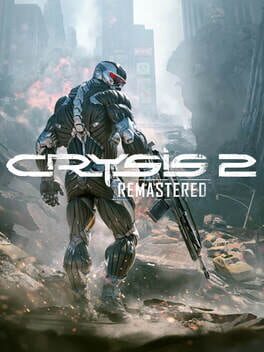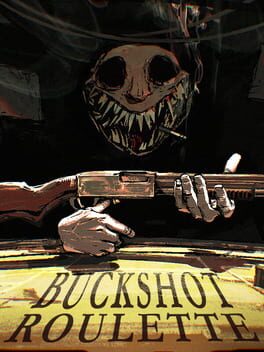Jerychon
76 Reviews liked by Jerychon
Darksiders III
2018
Everything about this game seemed like it'd hook me, like it'd be one of my favorite games, but for whatever reason I kept putting it deeper in my backlog, never giving it a chance.
The time finally came.
This is not just one of the best games ever but also the smartest game I have ever seen, nothing is unsolved, everything in the context of the universe makes sense, it's wonderful.
The DLC also completes the story in a really neat way which I appreciate, even if I didn't find it as good as the rest of the game.
The time finally came.
This is not just one of the best games ever but also the smartest game I have ever seen, nothing is unsolved, everything in the context of the universe makes sense, it's wonderful.
The DLC also completes the story in a really neat way which I appreciate, even if I didn't find it as good as the rest of the game.
Impostor Factory
2021
As the third installment in the To the Moon series (which I feel needs a better name), this continues the hallmarks of earnest characters and dialogue, moving music, and making you cry. While this is pitched as a departure for a more surreal and comedic tone, those tear-jerkers are still present. However, I spent the latter half of this game wondering what exactly this game was trying to say that the other two games had not already explored. By the time the credits had rolled, I still had nothing other than the memory of themes the previous two games tackled better.
Battle Panic
2013
Neat game idea, but when all the units clump together on dense waves it's impossible to efficiently support or attack important ones, and having no control over targeting means most of the time 80% of my army focuses on 20% of the enemy wave and all the expensive units fighting the rest of it get fucked, level 11 filtered me because of these issues, i thought i was just bad when i was 9 playing this but nah games just mid
The third installment of the Uncharted series was the first one I played, and despite not knowing much about the story from the first two games, I still enjoyed the hell out of it. It was also the first game I ever earned a trophy in, which adds a personal touch to my experience.
Once again, Nate is searching for an ancient mythical city, this time: Iram of the Pillars. The Islamic myth of Atlantis of the Sands is a neat idea that originates from the Quran, and truth be told, I know of it only because of this game. I like it when games revolve around mythical places that aren't the most mainstream thing ever, adding a unique flavor to the narrative.
Uncharted 3: Drake's Deception builds upon the foundation set by its predecessors with refined mechanics and new gameplay features. The melee combat system was significantly improved, making fights more dynamic and fluid, allowing for seamless transitions between punches, counters, and contextual actions. You can use the environment to your advantage during fights, such as slamming enemies into walls or using objects to attack.
The gunplay felt good, with shooting mechanics that are more polished, better aiming, and recoil management. Drake's climbing and traversal abilities are smoother and more intuitive thanks to improved animations and control responsiveness. The game features a variety of puzzles integrated into the environment and story, adding variety to the gameplay. Drake's journal often contains clues and hints that help solve the puzzles.
This game also features more robust stealth mechanics, allowing you to silently take down enemies and avoid detection. This adds a layer of strategy to certain encounters. There were sections where I would restart if detected and keep trying until I cleared the area undetected, but this was hard to achieve on higher difficulties. Surprisingly, the multiplayer was great, and I had a lot of fun playing it. It's a shame it's no longer available.
⚠️SPOILERS⚠️
Uncharted 3 is known for its cinematic set pieces, such as the famous cargo plane sequence, the sinking cruise ship, and the collapsing castle. These moments are seamlessly integrated into the gameplay, making the game memorable. When I think about "Uncharted 3" these great moments pop into my mind.
Adding to the list of great sequences are the young Nathan moments in Colombia where he first met Sully, the chase in Yemen, the desert visions, the ghost town, the horse riding through the desert, and finally, Iram of the Pillars/Ubar. The mythical city is gorgeous, and I was mind blown when the gates of the city opened and I got to see this great interpretation of it.
But.... why the hell does everything that's ancient in this series need to be destroyed, what's up with that? If an Uncharted game was set on an extraterrestrial planet, that planet would be destroyed by the end of the game.
Just like in Uncharted 2, It ruins the ending for me, once again. The entirety of the game you chase the discovery of an ancient mythical city only to destroy it, every fucking time.
Anyway, I really liked the pacing of the story; it probably has the best pacing out of all the Uncharted games. The cast is great with the likes of Nate, Sully, Elena, Chloe, Charlie, and Salim. I especially liked Sully's bond with Nathan, which is central to the story, providing both emotional depth and invaluable support.
That being said, Uncharted 3 is my favorite out of the first three games for its memorable moments and the bit of nostalgia it holds for me. It's a standout entry in the series, filled with thrilling adventures, compelling characters, and unforgettable set pieces.
Once again, Nate is searching for an ancient mythical city, this time: Iram of the Pillars. The Islamic myth of Atlantis of the Sands is a neat idea that originates from the Quran, and truth be told, I know of it only because of this game. I like it when games revolve around mythical places that aren't the most mainstream thing ever, adding a unique flavor to the narrative.
Uncharted 3: Drake's Deception builds upon the foundation set by its predecessors with refined mechanics and new gameplay features. The melee combat system was significantly improved, making fights more dynamic and fluid, allowing for seamless transitions between punches, counters, and contextual actions. You can use the environment to your advantage during fights, such as slamming enemies into walls or using objects to attack.
The gunplay felt good, with shooting mechanics that are more polished, better aiming, and recoil management. Drake's climbing and traversal abilities are smoother and more intuitive thanks to improved animations and control responsiveness. The game features a variety of puzzles integrated into the environment and story, adding variety to the gameplay. Drake's journal often contains clues and hints that help solve the puzzles.
This game also features more robust stealth mechanics, allowing you to silently take down enemies and avoid detection. This adds a layer of strategy to certain encounters. There were sections where I would restart if detected and keep trying until I cleared the area undetected, but this was hard to achieve on higher difficulties. Surprisingly, the multiplayer was great, and I had a lot of fun playing it. It's a shame it's no longer available.
⚠️SPOILERS⚠️
Uncharted 3 is known for its cinematic set pieces, such as the famous cargo plane sequence, the sinking cruise ship, and the collapsing castle. These moments are seamlessly integrated into the gameplay, making the game memorable. When I think about "Uncharted 3" these great moments pop into my mind.
Adding to the list of great sequences are the young Nathan moments in Colombia where he first met Sully, the chase in Yemen, the desert visions, the ghost town, the horse riding through the desert, and finally, Iram of the Pillars/Ubar. The mythical city is gorgeous, and I was mind blown when the gates of the city opened and I got to see this great interpretation of it.
But.... why the hell does everything that's ancient in this series need to be destroyed, what's up with that? If an Uncharted game was set on an extraterrestrial planet, that planet would be destroyed by the end of the game.
Just like in Uncharted 2, It ruins the ending for me, once again. The entirety of the game you chase the discovery of an ancient mythical city only to destroy it, every fucking time.
Anyway, I really liked the pacing of the story; it probably has the best pacing out of all the Uncharted games. The cast is great with the likes of Nate, Sully, Elena, Chloe, Charlie, and Salim. I especially liked Sully's bond with Nathan, which is central to the story, providing both emotional depth and invaluable support.
That being said, Uncharted 3 is my favorite out of the first three games for its memorable moments and the bit of nostalgia it holds for me. It's a standout entry in the series, filled with thrilling adventures, compelling characters, and unforgettable set pieces.
Great
Incredible
Outstanding
Extraordinary
Phenomenal
Remarkable
Unbelievable
Fantastic
Superb
Astonishing
Breathtaking
Flawless
Perfect
Magnificent
Spectacular
Unparalleled
Supreme
Top-notch
Unmatched
Impressive
Stellar
Awe-inspiring
Marvelous
Miraculous
Exceptional
Sensational
Brilliant
Glorious
Wonderful
Mind-blowing
Divine
Legendary
Terrific
Awesome
Elite
Astounding
Epic
Radiant
Grand
Prodigious
Exquisite
Splendid
Majestic
Fabulous
Heroic
Incomparable
Stunning
Superior
Amazing
Prime
Matchless
Best
Transcendent
Unrivaled
Peerless
Imposing
Exemplary
Ultimate
Preeminent
Sublime
Formidable
Triumphant
Optimal
Heavenly
Beaming
Prestigious
Dazzling
Noteworthy
Masterful
Exalted
Striking
Enchanting
Illustrious
Distinguished
Ravishing
Admirable
Fascinating
Wondrous
Resplendent
Almighty
Thrilling
Praiseworthy
Incredible
Outstanding
Extraordinary
Phenomenal
Remarkable
Unbelievable
Fantastic
Superb
Astonishing
Breathtaking
Flawless
Perfect
Magnificent
Spectacular
Unparalleled
Supreme
Top-notch
Unmatched
Impressive
Stellar
Awe-inspiring
Marvelous
Miraculous
Exceptional
Sensational
Brilliant
Glorious
Wonderful
Mind-blowing
Divine
Legendary
Terrific
Awesome
Elite
Astounding
Epic
Radiant
Grand
Prodigious
Exquisite
Splendid
Majestic
Fabulous
Heroic
Incomparable
Stunning
Superior
Amazing
Prime
Matchless
Best
Transcendent
Unrivaled
Peerless
Imposing
Exemplary
Ultimate
Preeminent
Sublime
Formidable
Triumphant
Optimal
Heavenly
Beaming
Prestigious
Dazzling
Noteworthy
Masterful
Exalted
Striking
Enchanting
Illustrious
Distinguished
Ravishing
Admirable
Fascinating
Wondrous
Resplendent
Almighty
Thrilling
Praiseworthy
This review contains spoilers
The second Uncharted significantly improved in many aspects over the first game, elevating the series to new heights. You can feel the leap in quality within the first hour of gameplay, it feels smoother, more polished, and overall, a more refined experience.
The game kicks off with the iconic falling train sequence, instantly grabbing your attention. This strong start sets the pace for the first hour, maintaining interest before picking up steam again mid-game. The narrative once again centers around the search for a mythical land, this time Shambala. The introduction of Chloe adds a fresh dynamic, but the reduced presence of Sully is felt. Elena shines once more as a key character, and while the antagonist Lazarevic is serviceable, he doesn’t quite steal the show. The story is compelling, with standout chapters like the dramatic train sequence and the thrilling Yeti encounter.
Traveling through stunning locations such as Borneo, Nepal, Tibet, and the Himalayas, the game offers breathtaking scenery and diverse environments. The gameplay enhancements are notable, particularly in the shooting mechanics, which feel more responsive and enjoyable.
⚠️SPOILERS⚠️
However, the ending, once an ending that I used to love, now feels underwhelming. Shambala, a mythical and sacred place, ends up being destroyed in a rather cliché manner. Instead of exploring its rich history and hidden secrets, the narrative opts for a dramatic but somewhat predictable conclusion. This destruction feels like a missed opportunity to delve deeper into Shambala’s mysteries and beauty, leaving me with a sense of lost potential. The game builds up this wondrous location, only to tear it down in a way that feels rushed and conventional, which diminishes the impact of reaching such a mythical place.
Despite this, Uncharted 2: Among Thieves remains an exceptional game. It might have its flaws, and some might argue it’s a bit overrated (I agree), but it undeniably pushed the series forward. With its improved gameplay, engaging story, and good visuals, it’s a memorable adventure that stands the test of time. While it may not be perfect, Uncharted 2: Among Thieves solidified its place as a cornerstone of the action-adventure genre and remains a must-play.
The game kicks off with the iconic falling train sequence, instantly grabbing your attention. This strong start sets the pace for the first hour, maintaining interest before picking up steam again mid-game. The narrative once again centers around the search for a mythical land, this time Shambala. The introduction of Chloe adds a fresh dynamic, but the reduced presence of Sully is felt. Elena shines once more as a key character, and while the antagonist Lazarevic is serviceable, he doesn’t quite steal the show. The story is compelling, with standout chapters like the dramatic train sequence and the thrilling Yeti encounter.
Traveling through stunning locations such as Borneo, Nepal, Tibet, and the Himalayas, the game offers breathtaking scenery and diverse environments. The gameplay enhancements are notable, particularly in the shooting mechanics, which feel more responsive and enjoyable.
⚠️SPOILERS⚠️
However, the ending, once an ending that I used to love, now feels underwhelming. Shambala, a mythical and sacred place, ends up being destroyed in a rather cliché manner. Instead of exploring its rich history and hidden secrets, the narrative opts for a dramatic but somewhat predictable conclusion. This destruction feels like a missed opportunity to delve deeper into Shambala’s mysteries and beauty, leaving me with a sense of lost potential. The game builds up this wondrous location, only to tear it down in a way that feels rushed and conventional, which diminishes the impact of reaching such a mythical place.
Despite this, Uncharted 2: Among Thieves remains an exceptional game. It might have its flaws, and some might argue it’s a bit overrated (I agree), but it undeniably pushed the series forward. With its improved gameplay, engaging story, and good visuals, it’s a memorable adventure that stands the test of time. While it may not be perfect, Uncharted 2: Among Thieves solidified its place as a cornerstone of the action-adventure genre and remains a must-play.
Citizen Sleeper
2022
"To be human and to be humane are two very different things."-Some 15 year old on Tiktok, probably.
Before I start this review, I'd like to give a massive thanks to @duhnuhnuh for gifting me a copy of this game. They have a steam giveaway list on their profile, so check that out!
Citizen sleeper is a game about obsolescence. This is made clear when you start the game, your robotic body already failing due to built in corporate dependency, washed up on an old space station that frankly, kinda sucks. A story about people who've either achieved their goals or become complacent. It's a cyberpunk setting, so implants, corrupt mercs, and lower city crime gangs abound here, but all with such stellar execution.
Once you finish the tutorial, you're pretty much free to explore the city at your leisure. You talk to people and take on odd jobs to get by and expand your scope of the city, in a day to day system similar to something like Animal Crossing and Stardew Valley, only your body can shut down if you don't take enough drugs. Standard stuff.
But the sandbox element is a great draw. It's not super limiting and anything that does have a deadline is pretty generous, the only limit is needing a specific dice which rng could just not give you (Feng bro I'm so sorry) The implant system is generally a genius mechanic, beautifully blending gameplay and narrative together. Do you use another for more desperate attempts at the dice, or do you wait until your robotic body is barely functional? Choice is yours.
But above all that, Citizen sleeper is a game about people. People stuck in the same situation as you just trying to get by. People like Tala and Emphis just trying to make the best of their situation, people like Sabine and Feng trying to change the system entirely, and people like Lem just working for themselves. I straight up cannot think of a bad character in this game.
The next thing I gotta praise is the atmosphere in general. Even at the start when you're trying to get your bearings, the world's beautiful setting and sound design keep you invested, as well as the general mystery of what's the next thing out there. If I fill this meter, what do I get? What, or who, is there for me? I gotta buy access to the next part of the ship? Sure thing, who's there? It's just such a brilliant setting.
If there's one thing I think should be looked into for the next game, I think more variance in sprites should be nice. Character sprites only change after a dramatic turning point in their plotlines, so just a few different emotion sprites would add greatly to the immersion.
So overall, it's just a masterpiece of an experience that left me engaged throughout, and a game you just need to play. I only got one of eight possible endings, so I'll definitely be returning at some point.
Before I start this review, I'd like to give a massive thanks to @duhnuhnuh for gifting me a copy of this game. They have a steam giveaway list on their profile, so check that out!
Citizen sleeper is a game about obsolescence. This is made clear when you start the game, your robotic body already failing due to built in corporate dependency, washed up on an old space station that frankly, kinda sucks. A story about people who've either achieved their goals or become complacent. It's a cyberpunk setting, so implants, corrupt mercs, and lower city crime gangs abound here, but all with such stellar execution.
Once you finish the tutorial, you're pretty much free to explore the city at your leisure. You talk to people and take on odd jobs to get by and expand your scope of the city, in a day to day system similar to something like Animal Crossing and Stardew Valley, only your body can shut down if you don't take enough drugs. Standard stuff.
But the sandbox element is a great draw. It's not super limiting and anything that does have a deadline is pretty generous, the only limit is needing a specific dice which rng could just not give you (Feng bro I'm so sorry) The implant system is generally a genius mechanic, beautifully blending gameplay and narrative together. Do you use another for more desperate attempts at the dice, or do you wait until your robotic body is barely functional? Choice is yours.
But above all that, Citizen sleeper is a game about people. People stuck in the same situation as you just trying to get by. People like Tala and Emphis just trying to make the best of their situation, people like Sabine and Feng trying to change the system entirely, and people like Lem just working for themselves. I straight up cannot think of a bad character in this game.
The next thing I gotta praise is the atmosphere in general. Even at the start when you're trying to get your bearings, the world's beautiful setting and sound design keep you invested, as well as the general mystery of what's the next thing out there. If I fill this meter, what do I get? What, or who, is there for me? I gotta buy access to the next part of the ship? Sure thing, who's there? It's just such a brilliant setting.
If there's one thing I think should be looked into for the next game, I think more variance in sprites should be nice. Character sprites only change after a dramatic turning point in their plotlines, so just a few different emotion sprites would add greatly to the immersion.
So overall, it's just a masterpiece of an experience that left me engaged throughout, and a game you just need to play. I only got one of eight possible endings, so I'll definitely be returning at some point.
This game was a big surprise. An emotionally gripping journey through the tragedies of World War I that uses beautiful art style, captivating storytelling and immersive gameplay mechanics.
The story of Valiant Hearts excels in capturing the human side of war, focusing on the experiences of ordinary people caught up in horrors of war. It's a deeply moving story, with great characters and each one has their own personal narrative.
I really loved this game, can't wait to try the new one someday.
The story of Valiant Hearts excels in capturing the human side of war, focusing on the experiences of ordinary people caught up in horrors of war. It's a deeply moving story, with great characters and each one has their own personal narrative.
I really loved this game, can't wait to try the new one someday.
Splinter Cell: Pandora Tomorrow is a respectable sequel to the first game, but still retains all of its jank, making it equally frustrating despite its magnificent ideas.
There are some meaningful improvements from Splinter Cell 1. The swat turn is invaluable for staying unnoticed in certain indoor situations, and there is now an indicator for whether it's safe to hide a body. The laser sight on the pistol allows you to see exactly where your shot will land with the tradeoff that it's also visible to enemies. It's still ultimately a bandaid solution to the problem with Splinter Cell's shooting, though. The unpredictable bullet trajectory, which seems to exist to discourage shooting willy-nilly, can also completely blow your cover when you line up a seemingly accurate shot only for it to come out of your gun sideways and alert everyone nearby. Adding a sight made this issue less frustrating, but it just didn't need to be there in the first place and it took until the third game for Ubisoft to finally do away with it.
The lighting and atmosphere are superb as ever, and the level variety is much better than in Splinter Cell 1, with much more diverse and memorable locations.
Unfortunately the action sequences from the first game have been forced in again, though thankfully slightly fewer in number and I found them less annoying. But they also just didn't need to be there and it once again took until the series' third attempt to understand this. And even then, Chaos Theory didn't completely learn from the mistakes of its predecessors.
The detection system is incredibly janky, much like Splinter Cell 1, and was by far the most frustrating issue I had with this game. Even the tiniest movements could make the enemy turn around and start blasting while alerting everyone around immediately. This is the main reason, along with the bad combat sequences, that I can rarely recommend the first two Splinter Cell games.
There are some meaningful improvements from Splinter Cell 1. The swat turn is invaluable for staying unnoticed in certain indoor situations, and there is now an indicator for whether it's safe to hide a body. The laser sight on the pistol allows you to see exactly where your shot will land with the tradeoff that it's also visible to enemies. It's still ultimately a bandaid solution to the problem with Splinter Cell's shooting, though. The unpredictable bullet trajectory, which seems to exist to discourage shooting willy-nilly, can also completely blow your cover when you line up a seemingly accurate shot only for it to come out of your gun sideways and alert everyone nearby. Adding a sight made this issue less frustrating, but it just didn't need to be there in the first place and it took until the third game for Ubisoft to finally do away with it.
The lighting and atmosphere are superb as ever, and the level variety is much better than in Splinter Cell 1, with much more diverse and memorable locations.
Unfortunately the action sequences from the first game have been forced in again, though thankfully slightly fewer in number and I found them less annoying. But they also just didn't need to be there and it once again took until the series' third attempt to understand this. And even then, Chaos Theory didn't completely learn from the mistakes of its predecessors.
The detection system is incredibly janky, much like Splinter Cell 1, and was by far the most frustrating issue I had with this game. Even the tiniest movements could make the enemy turn around and start blasting while alerting everyone around immediately. This is the main reason, along with the bad combat sequences, that I can rarely recommend the first two Splinter Cell games.
Pseudoregalia
2023
As a 3D platformer, this game is fantastic. Beyond the movement being extremely fluid and responsive it has an aspect that I seek out of 3D platformers, expressing yourself with said movement. You can, in a way, sequence break levels, which I did a lot by abusing the wallkick, to the point that the bounce jump was the very last upgrade I got. It's the perfect combination of letting you go crazy with the sandbox of movement, but also incentivizing you to do so.
However, as a metroidvania, ehh...
The combat just sort of exists and while the lack of a map is a problem the real issue the lack of direction. It never actually feels like any of the areas are connected, so a lot of time I got this feeling of "Oh, I'm here?" At the very least I appreciate the game's direction of "Just go find these 5 thingamagigs and get to the end."
The foundation is more than great, so I'm hoping a sequel comes one day to polish the rough edges.
However, as a metroidvania, ehh...
The combat just sort of exists and while the lack of a map is a problem the real issue the lack of direction. It never actually feels like any of the areas are connected, so a lot of time I got this feeling of "Oh, I'm here?" At the very least I appreciate the game's direction of "Just go find these 5 thingamagigs and get to the end."
The foundation is more than great, so I'm hoping a sequel comes one day to polish the rough edges.
Crysis 3 Remastered
2021
(reposting as I reviewed a different version of the game from the one I played)
A middling end to a middling series.
The first few hours of Crysis 3 were the most fun I had in any of the Crysis games. (Note that at the time of writing this review, I have not played Crysis Warhead.) The predator bow is awesome and the levels are well designed for creative gameplay approaches. The game fully embraces a sneaky hit-and-run disappearing into the shadows style of combat which is where this series is strongest. After Crysis 2's sharp turn into linearity, it seems the developers listened and brought back some of the sandbox creativity from Crysis 1. On top of that, it all takes place in beautiful overgrown ruins of New York, totally dripping with atmosphere. It's tremendous fun.
For a while.
Then the game's hurried development rears its ugly head. Crysis 3 is much shorter than Crysis 1 and 2, and it seems the developers knew this because the back half of the game mostly consists of large swathes of land with objectives plonked at opposite ends, which you just sprint or drive across with no actual content in between. It's a very obvious attempt to pad the game's length for as long as possible because it would otherwise be about four hours long. The last level turns into a corridor but still blatantly tries to delay the game's conclusion with pointless objectives and it plays like discount Halo, with a terrible final boss to boot. But desperately trying to stretch the game's length like this only served to make the game's final act more exhausting to get through, despite it still being shorter than its predecessors.
The Crysis series was built on a fine premise of a sandbox shooter with stealth-infused predator style combat. But somehow it let a mountain of potential slip through its fingers and each game fumbled the premise in unique ways. I still think the series deserves a revival, but only if it seriously takes its failures into account and properly builds on its strengths. There is definitely room in the market for a sandbox shooter that isn't Far Cry. A new Crysis would only have to stick to its guns and avoid trading player freedom for linear corridor levels, and ideally drop its nonsensical plot. But as it is, this series will probably be forgotten except for how amazing the first game's graphics looked in 2007.
A middling end to a middling series.
The first few hours of Crysis 3 were the most fun I had in any of the Crysis games. (Note that at the time of writing this review, I have not played Crysis Warhead.) The predator bow is awesome and the levels are well designed for creative gameplay approaches. The game fully embraces a sneaky hit-and-run disappearing into the shadows style of combat which is where this series is strongest. After Crysis 2's sharp turn into linearity, it seems the developers listened and brought back some of the sandbox creativity from Crysis 1. On top of that, it all takes place in beautiful overgrown ruins of New York, totally dripping with atmosphere. It's tremendous fun.
For a while.
Then the game's hurried development rears its ugly head. Crysis 3 is much shorter than Crysis 1 and 2, and it seems the developers knew this because the back half of the game mostly consists of large swathes of land with objectives plonked at opposite ends, which you just sprint or drive across with no actual content in between. It's a very obvious attempt to pad the game's length for as long as possible because it would otherwise be about four hours long. The last level turns into a corridor but still blatantly tries to delay the game's conclusion with pointless objectives and it plays like discount Halo, with a terrible final boss to boot. But desperately trying to stretch the game's length like this only served to make the game's final act more exhausting to get through, despite it still being shorter than its predecessors.
The Crysis series was built on a fine premise of a sandbox shooter with stealth-infused predator style combat. But somehow it let a mountain of potential slip through its fingers and each game fumbled the premise in unique ways. I still think the series deserves a revival, but only if it seriously takes its failures into account and properly builds on its strengths. There is definitely room in the market for a sandbox shooter that isn't Far Cry. A new Crysis would only have to stick to its guns and avoid trading player freedom for linear corridor levels, and ideally drop its nonsensical plot. But as it is, this series will probably be forgotten except for how amazing the first game's graphics looked in 2007.
Crysis 2 Remastered
2021
(reposting as I reviewed a different version of the game from the one I played)
It's one of the seventh gen shooters of all time.
Given the resounding disappointment surrounding Crysis 2 after Crysis 1 was such a boundary pushing game for the time, I expected a lot less of this game. But while it does feel stripped back compared to its predecessor, there is still merit in this game's ideas.
It's certainly nothing to write home about, and could easily get lost in the seventh gen sea of brownish shooters, but it's a fairly solid campaign with some fun setpieces that make it feel like an action movie. And the remastered graphics look excellent. Somehow this game got a much better remaster than Crysis 1 did, despite that game having a legendary reputation for its graphics.
While Crysis 2 lacks the open world design of Crysis 1, the levels are still built to allow multiple approaches. I found the cloak to be much more useful and fun in Crysis 2, but in both games I found armour mode underwhelming. I rarely used it tactically; it was more of a necessity to not die in a matter of seconds against certain enemies.
The much maligned aliens are back in Crysis 2, but I found them to be a lot more enjoyable to fight this time around because they're on the ground and use tactics like cover and cloaking, rather than flying space jellyfish that you just empty endless rounds into with little strategy or creativity involved. I got the feeling that the developers may have taken some inspiration from Halo for the aliens in this game. One thing that was not inspired however, was the AI. Both the aliens and humans have really stupid AI and it feels like a missed opportunity to make firefights more dynamic and tactical. Sometimes they would just stand there trying to figure out where I went.
Though I did find the remaster job better this time around, one issue I ran into was some severe slowdowns in the level Masks Off. It was only limited to this level, but it affected the gameplay experience quite badly.
There isn't really anything wrong with Crysis 2; it only suffers from sharing a name with a much more ambitious and unique game. Though it didn't reach the highs of Crysis 1, it avoided the lows and was a more consistent experience overall. The last third or so of Crysis 1 severely loses steam. The story and setting of Crysis 2 are unremarkable and feel very characteristic of the era, which was dominated by brown and grey shooters, but it was decent enough for me to finish. It's a perfectly average shooter.
It's one of the seventh gen shooters of all time.
Given the resounding disappointment surrounding Crysis 2 after Crysis 1 was such a boundary pushing game for the time, I expected a lot less of this game. But while it does feel stripped back compared to its predecessor, there is still merit in this game's ideas.
It's certainly nothing to write home about, and could easily get lost in the seventh gen sea of brownish shooters, but it's a fairly solid campaign with some fun setpieces that make it feel like an action movie. And the remastered graphics look excellent. Somehow this game got a much better remaster than Crysis 1 did, despite that game having a legendary reputation for its graphics.
While Crysis 2 lacks the open world design of Crysis 1, the levels are still built to allow multiple approaches. I found the cloak to be much more useful and fun in Crysis 2, but in both games I found armour mode underwhelming. I rarely used it tactically; it was more of a necessity to not die in a matter of seconds against certain enemies.
The much maligned aliens are back in Crysis 2, but I found them to be a lot more enjoyable to fight this time around because they're on the ground and use tactics like cover and cloaking, rather than flying space jellyfish that you just empty endless rounds into with little strategy or creativity involved. I got the feeling that the developers may have taken some inspiration from Halo for the aliens in this game. One thing that was not inspired however, was the AI. Both the aliens and humans have really stupid AI and it feels like a missed opportunity to make firefights more dynamic and tactical. Sometimes they would just stand there trying to figure out where I went.
Though I did find the remaster job better this time around, one issue I ran into was some severe slowdowns in the level Masks Off. It was only limited to this level, but it affected the gameplay experience quite badly.
There isn't really anything wrong with Crysis 2; it only suffers from sharing a name with a much more ambitious and unique game. Though it didn't reach the highs of Crysis 1, it avoided the lows and was a more consistent experience overall. The last third or so of Crysis 1 severely loses steam. The story and setting of Crysis 2 are unremarkable and feel very characteristic of the era, which was dominated by brown and grey shooters, but it was decent enough for me to finish. It's a perfectly average shooter.
